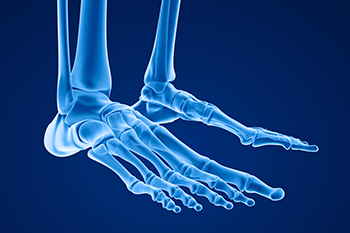
The biomechanics of the feet are interesting to learn about. The ankle is a complex part of the body, and each part of the ankle joint is responsible for different functions. The 26 bones in each foot are categorized into three sections, consisting of the tarsal and metatarsal bones, in addition to the phalanges. There are joints that are located between the tarsal bones and various areas of the metatarsal bones. There are two groups of muscles that are found in each foot, and the toes can be extended by using the dorsal foot muscles. The muscles in the sole of the foot are referred to as the plantar muscles and are divided into groups. The lateral plantar muscles are connected to the fifth toe, and the other four toes are linked to the central plantar muscles. If you would like additional information about the workings of the foot bones and muscles, it is suggested that you confer with a podiatrist who can provide you with the information you are seeking.
If you have any concerns about your feet, contact Howard Abramsohn, DPM from Ambulatory Foot and Ankle Associates, LLC. Our doctor can provide the care you need to keep you pain-free and on your feet.
Biomechanics in Podiatry
Podiatric biomechanics is a particular sector of specialty podiatry with licensed practitioners who are trained to diagnose and treat conditions affecting the foot, ankle and lower leg. Biomechanics deals with the forces that act against the body, causing an interference with the biological structures. It focuses on the movement of the ankle, the foot and the forces that interact with them.
A History of Biomechanics
- Biomechanics dates back to the BC era in Egypt where evidence of professional foot care has been recorded.
- In 1974, biomechanics gained a higher profile from the studies of Merton Root, who claimed that by changing or controlling the forces between the ankle and the foot, corrections or conditions could be implemented to gain strength and coordination in the area.
Modern technological improvements are based on past theories and therapeutic processes that provide a better understanding of podiatric concepts for biomechanics. Computers can provide accurate information about the forces and patterns of the feet and lower legs.
Understanding biomechanics of the feet can help improve and eliminate pain, stopping further stress to the foot.
If you have any questions please feel free to contact our office located in Mt Laurel Township, NJ . We offer the newest diagnostic and treatment technologies for all your foot and ankle needs.
